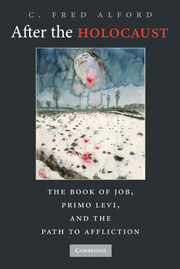2 - Job, Transitional Space, and the Ruthless Use of the Object
Published online by Cambridge University Press: 05 June 2012
Summary
The usual psychoanalytic approach to religion has changed from an analysis of the defensive psychological function of religious belief – Freud's approach – to an analysis of the transference. For Freud, particularly in Totem and Taboo (1912), religion is an obsessional neurosis, an attempt to ward off guilt by repetition. Guilt stems from the primal horde's killing of the father, an event reproduced in every boy's oedipal struggle with his own father. Religion is the obsessive repetition of the ritualized reconciliation with an idealized patriarchal father god. “By rooting religion in the instinctual life of the child, Freud offered a biological hermeneutic of the sacred” (Jones 1991, 2).
In his later work, The Future of an Illusion (1927), Freud understood religion in both less reductive and less speculative terms. Religion reduces the terror of an uncaring nature by personalizing the natural order. Religion removes the fear of death by providing the illusion of immortality. Above all, religion reconciles us to the self-denial required by civilization by promising an infinite happiness in the hereafter. In this work, Freud was confident that the future would bring with it a weakening of the need for religious illusion. Piety would be abandoned and morality assumed. Noble sentiments, indeed, but difficult to reconcile with the dark vision of Civilization and Its Discontents (1930), which was published only three years later.
- Type
- Chapter
- Information
- After the HolocaustThe Book of Job, Primo Levi, and the Path to Affliction, pp. 26 - 57Publisher: Cambridge University PressPrint publication year: 2009



